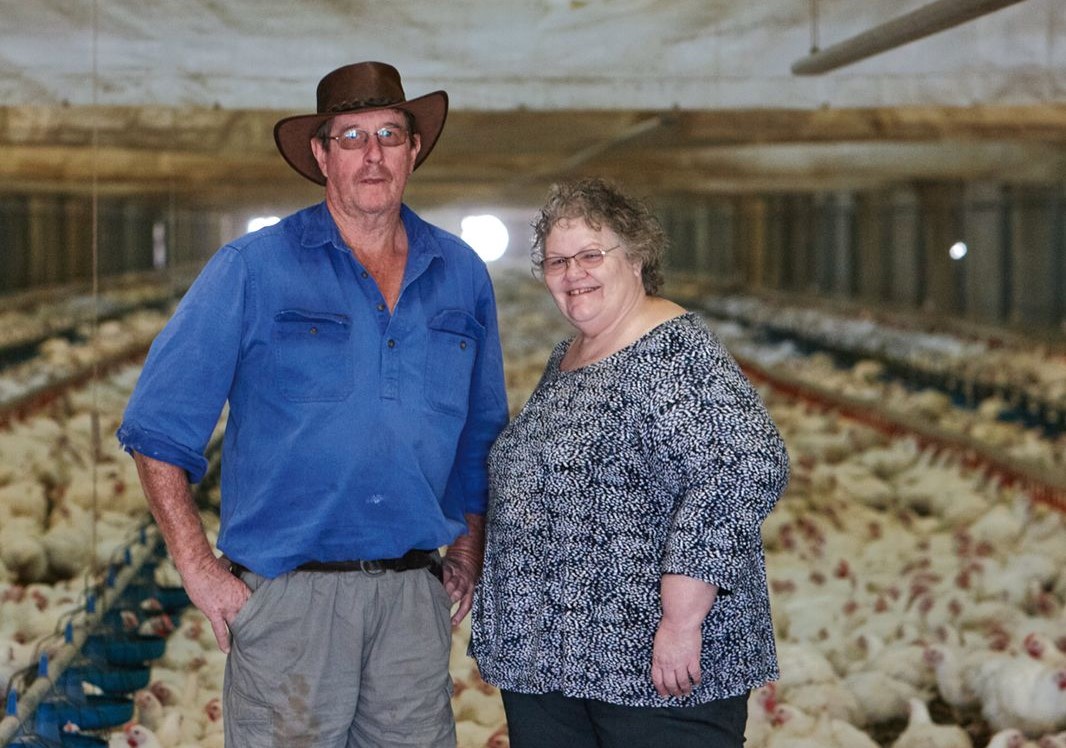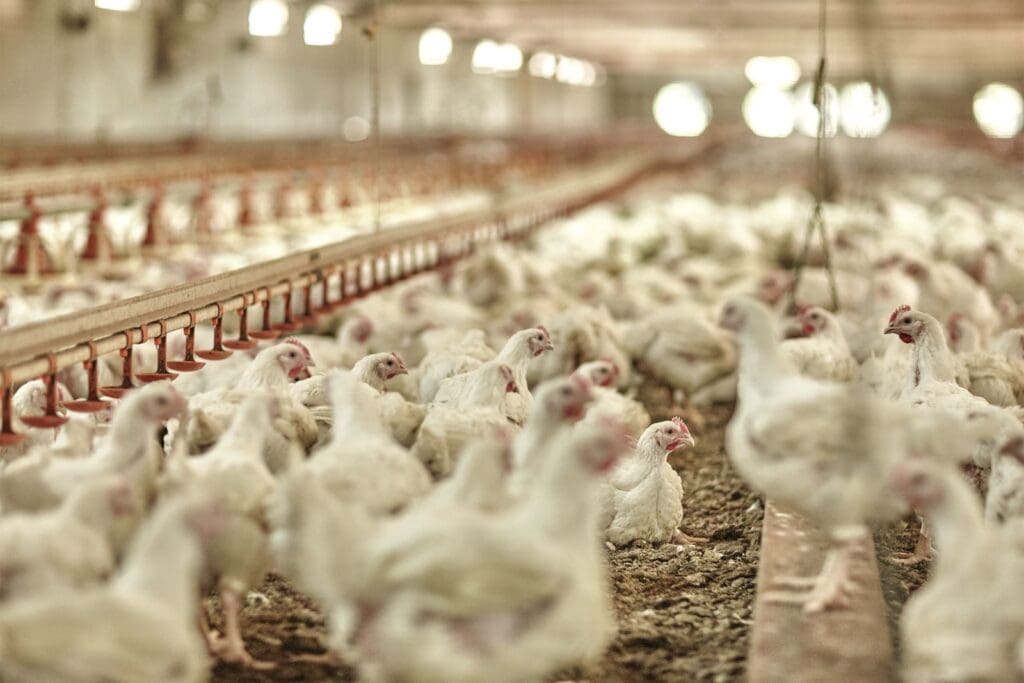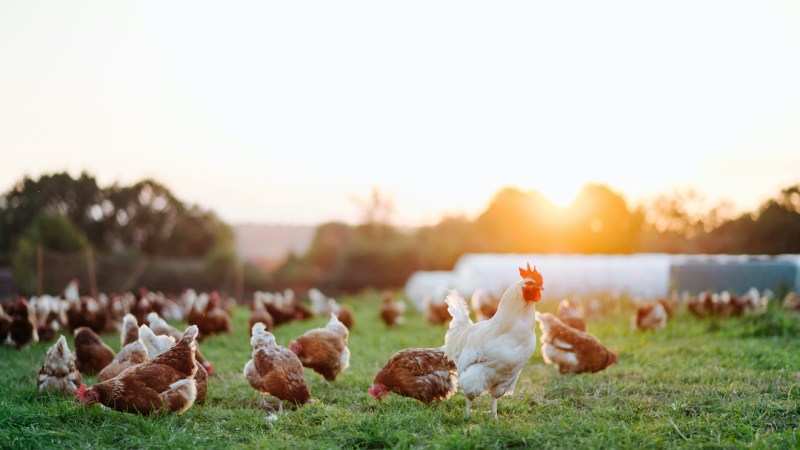Traditionally in Australia, the family farm has been passed on to the next generation. But…
Australia must follow US to protect chicken producers

US President Joe Biden recently took some bold steps to increase competition across a range of American industries by releasing an executive order to flatten the playing field and make it easier for smaller operations to compete.
The Executive Order on Promoting Competition in the American Economy focuses on a range of sectors, but its reference to the impact consolidation has had on small family farms, particularly chicken producers, was certainly not missed in Australia.
Farming lobby groups including NSW Farmers and the National Farmers’ Federation (NFF) were quick to support the order with the key message being if it is good enough for the US, then it is good enough for us.
More processor competition needed
John Courtney had farmed chickens at Casino in NSW for 18 years with his wife, Jenny. For many years the Courtneys dealt successfully with Sunnybrand Chickens. In 2012 Ingham’s Chicken bought the smaller processor out, and their growing contract was transferred across.
The Courtneys continued to provide growing services to Ingham’s until their contract expired, evaporating years of hard work and significant capital investment overnight.
The total operation including farm and infrastructure, once valued at $4.8 million, immediately dropped in value to $1.1 million with the loss of the growing contract.
“The entire chicken infrastructure including the sheds cost $3.5 to $4 million to put there but the bank is now valuing it at $120,000,” John told The Muster.

The Courtneys were not alone. Around 15 contracted chicken growers in the NSW Northern Rivers lost contracts as the processors moved production to operations in South East Queensland.
According to John, Ingham’s don’t produce meat chickens in NSW anymore and, apart from a very small operation in far north Queensland, Baiada don’t produce chicken in Queensland.
He said the processors have staked out their territories resulting in regional monopolies for the farmers who supply the growing services.
“This has got to be bad for national food security with the production of chicken being concentrated in such confined areas,” John said.
“Governments both state and federal keep espousing the need for growth of regional infrastructure. Here is a golden opportunity in the Northern Rivers for $50 million in chicken growing assets currently doing nothing. At the end of the day it has been government approvals of acquisitions, takeovers and foreign investors that has got us to this position.”
Nowadays, John is managing a farm at Ebor located over three hours drive from his home and his wife, just to keep the farm afloat.
He has looked into growing other products in his sheds including mushrooms, blueberries and even medicinal cannabis but none offer the cash flow of the chicken growing contracts.
“We’ve had a look at many things, and they all require huge capital input and there is no guarantee you are going to get a return at the end of it. I’m 67 next month and am I prepared to blow another million bucks and hope it works? Probably not,” he said.
He says Australia should absolutely adopt the policies being put in place in the US but added nothing will change until there is more competition at the processor level and standard contracts are extended beyond five years.
“I can see it working here but there has got to be more competition in the industry. When we were growing chickens originally we could have grown for four different companies now there is only two and none of them want us,” John said.
“They talk about corporatisation but all I can see is monopolies and the small players never win with a monopoly.”
Biden’s issues ring true here
Just over a decade ago, NSW had nine significant chicken meat processing plants owned by six different companies. But as time has gone by this has dwindled to four which are owned by two companies.
The executive order from Biden refers to issues of consolidation and highlights how farmers are being “squeezed between concentrated market power in the agricultural input industries — seed, fertilizer, feed, and equipment suppliers — and concentrated market power in the channels for selling agricultural products.
The loss of competition in the poultry meat industry has had a similar effect. The integrators are able to squeeze the farmers at the input and output end, controlling the farmers and eroding their profits.
Sound familiar?
NSW Farmers President James Jackson thinks so.
“Australia’s poultry meat landscape is highly comparable to the United States. Poultry farmers in both countries unsurprisingly face weak bargaining power and diminished returns,” Mr Jackson said.
“President Biden’s acknowledgment that consolidation weakens competition is a breakthrough moment, and we hope to see similar recognition here in Australia.”
National Farmers’ Federation CEO Tony Mahar says now is the time for Australia to follow suit and end the control chicken meat processors have over farmers.
“We have countless situations in Australia where growers painstakingly negotiate a farm-gate price over many months, only for any gains to be wiped out by processors unilaterally increasing the cost of mandated inputs they sell to the grower or new requirements to upgrade sheds and capital equipment,” Mr Mahar said.
“This is simply wrong and not in keeping with the principles of competition and fair dealings.”
Ending grower ranking systems
Biden’s executive order also seeks to prohibit unfair practices relating to growing ranking systems, by which processors control the inputs that determine how much a farmer is paid, while also pushing the risk onto the farmer and making them more economically vulnerable.
Mr Jackson said this type of practice is rife in Australia and must end.
“The Executive Order prohibits unfair practices in US grower ranking systems, in which poultry processors exercise extraordinary control over the key inputs that determine the amount farmers are paid and require farmers to assume the risk of factors outside their control, often leaving them economically vulnerable,” he said.
Poultry contracts easily torn up
The tendency for all the risk to be put back on the producer sets local farmers up for all kinds of trouble.
An example of this was reported on by The Farmer magazine last year when two NSW families, including the Courtneys, were told their services as poultry producers were no longer required after they had both invested heavily in sheds and infrastructure to increase capacity.
“Essentially, poultry farmers are required to make sizeable infrastructure investments only to face the possibility that their contracts can be terminated with little to no notice, with no alternative contract arrangements to fall back on,” Mr Jackson said.
“Poultry farmers do not own the birds but care for them on behalf of powerful processing companies and are required to own and maintain the sheds, equipment and resources needed to do this.”
Investigating the problem
Last November, the Australian Competition and Consumer Commission (ACCC) tabled a report into its national perishable agricultural goods inquiry. The ACCC reviewed contracts between processors and their chicken growers and came to the preliminary view that a number of terms may raise concerns under the unfair contract term laws.
The report said “The ACCC also reviewed standard form contracts between processors and growers in the chicken meat industry. Our preliminary view is that a number of terms may raise concerns under the unfair contract term laws. These contracts contain types of terms the ACCC has previously considered to be unfair in other PAG industries”
The competition watchdog is now conducting further investigations into the unfair contract terms in the chicken meat industry.
Mr Jackson welcomed the ACCC’s report. “The ACCC acknowledged power discrepancies are likely to arise in perishable supply chains and made a suite of recommendations including a prohibition on unfair trading practices,” he said.
“We still await the government’s response to this inquiry and a tangible outcome for our contract poultry growers. NSW Farmers continues to urge the Australian Government to institute a mandatory code of conduct for the poultry meat industry.”
The NFF backed up the calls for government action. “We call on the Australian policymakers to take note of developments in the United States and act swiftly to afford Australian chicken growers the same protections,” Mr Mahar said.
For more information on the issues faced by NSW chicken producers, please enjoy a story published in The Farmer magazine last year, Poultry Returns.








